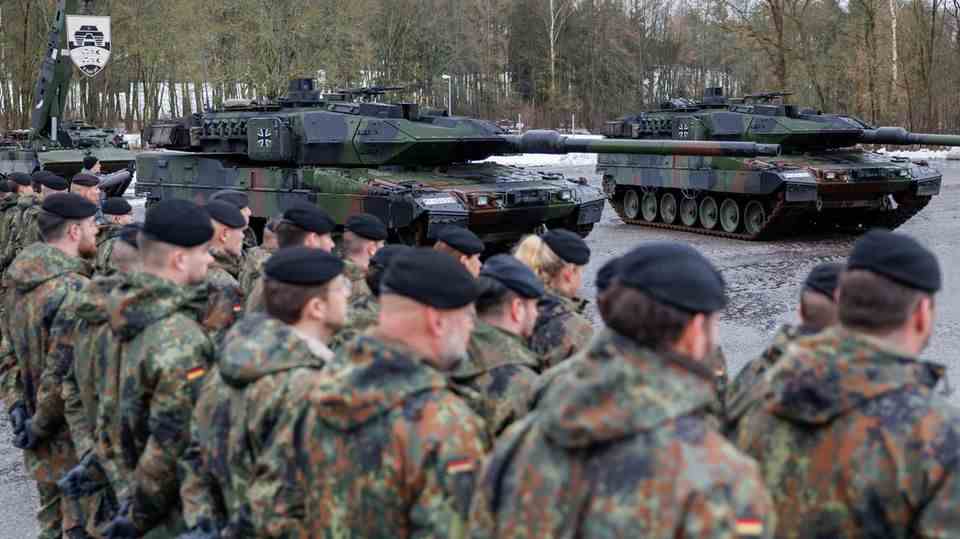A “mistake” that needs to be corrected – or a “ghost discussion”? Germany is once again arguing about conscription. But why was she actually abandoned?
Germany is rediscovering conscription, at least the dispute over its suspension in view of the Russian warmongering is gaining momentum again.
Since Federal Defense Minister Boris Pistorius (SPD) had touched the hot potato again by retrospectively calling the end of compulsory service with the weapon “Mistake” designated, the scholars argue about the meaning and purpose of a possible return. Or is it a “ghost discussion”, as FDP leader Christian Lindner replied?
Some call it so, others so. There have been numerous voices on the subject from both politics and the military in the past few days:
- “My heartfelt request to those responsible in the Ministry of Defense is: no insubstantial debate about a new edition of conscription, which costs time and money and would also blatantly violate military justice,” said FDP parliamentary group leader Christian Dürr on Monday to Editorial network Germany (RND).
Dürr specifically mentioned the marine inspector Jan Christian Kaackwho previously debated a comeback of conscription welcomed and brought a Norwegian-style reintroduction into play.
The FDP defense politician Agnes-Strack Zimmermann had recently in the “Sueddeutsche Zeitung” more fundamental thoughts on the subject, the Union again stimulated a discussion about a “general obligation to serve”.which is not limited to the Bundeswehr.
Finally saw himself Chancellor Olaf Scholz (SPD) to comment on his spokesman. This referred tothat the conversion from the conscript army to the professional army “can’t just be reversed”. In this respect, “especially in the current phase (…) there is actually a lack of substance in such a debate”.
Of course, the many comments show and the repeated discussionthat the suspension of general conscription is still a major hot topic. No further questions, except: Why was she actually abandoned?
Out of conscription
The reform of the armed forces, which in 2011 meant, among other things, the end of conscription, which had existed since 1956, was already controversial at the time. However, they did reform planswhich the then Federal Defense Minister Karl-Theodor zu Guttenberg (CDU) initiated under different circumstances than today and have been promoted for years supported by a majority of Germans. At the latest with Russia’s attack on Ukraine, the mood in the Federal Republic has changed relative majority would now support reintroduction.
At the time, a black-yellow coalition ruled in Berlin, with Angela Merkel (CDU) as Federal Chancellor and Guido Westerwelle (FDP) as her Vice President. Shortly before the then Federal Defense Minister Guttenberg fell over a plagiarism scandalthe CSU politician said Recommendations of its Bundeswehr Structure Commission which, in addition to a reduction in the size of the troops, also provided for the suspension of general conscription and the introduction of voluntary military service.
His successor in office, Thomas de Maizière, had to implement the reform plans (CDU). “I don’t think it’s a joy today that we’re suspending conscription here,” he told parliament. However, it can no longer be justified in terms of security policy, Germany needs efficient and affordable armed forces – he was completely with Guttenberg.
To put it simply, conscription, which had existed since 1956, no longer seemed up to date. Germany believed it was surrounded by friends instead of enemies, and the need for a conscript army was no longer considered a given – most NATO countries had already switched to professional armies by the end of the Cold War. In addition, savings should be made and the troops specialized in foreign missions.
“Today we no longer need disproportionately large numbers, but highly professional armed forces that can be deployed quickly and sustainably over long distances for difficult and difficult missions and scenarios and can also be deployed accordingly,” said Guttenberg at the time.
In addition, there were always more able-bodied men than were needed for the army. Consequently, not everyone had to take up the service at the gun – what that problem of military justice opened. With the suspension of compulsory military service, the federal government at the time possibly only forestalled a later judgment by the Federal Constitutional Court.
“Conscription, as we know it, is not necessary in today’s situation”
However, conscription was not abolished, i.e. deleted from the Basic Law. It has been suspended, is not practiced, so to speak. In addition, the end of compulsory service only applies in peacetime and can be reactivated in the event of tension or defense.
This was recently pointed out by FDP defense expert Strack-Zimmermann, who also described a “simple yes or no” in the debate on the reintroduction as “jumping too short”. However, their statements were “exaggerated and misrepresented” in an agency report, reactivation is not an option for them, clarified Strack-zimmermann.
In fact, she had in the “Sueddeutsche Zeitung” specifically speaking of many of the challenges that a return to conscription would bring.
- Among other things, many Bundeswehr barracks would have to be “built or expanded”, which in itself is a huge challenge.
- There would also be a lack of instructors and equipment.
- Last but not least, Strack-Zimmermann is convinced that conscription must now also apply to women under constitutional law. So far, according to Article 12a of the Basic Law, every male German citizen “from the age of eighteen can be obliged to serve in the armed forces, in the federal border police or in a civil defense association”.
A return to conscription would therefore already entail structural problems that could not be resolved quickly. Especially since the demands on the Bundeswehr have changed over the years.
Against this background, Carlo Masala, Professor of International Politics at the University of the Federal Armed Forces in Munich, expressed skepticism about conscription as early as October. “Everything that is and is militarily important cannot be had with a flow heater called conscription,” he said “taz”. The war of the 21st century is not the war that is currently being waged in Donbass, said Masala, referring to the front in Ukraine. “The Russians would wage another war against us. You don’t need mass armies for that, we need professionals who are well trained.”
Similar as Eberhard Zorn put it, Inspector General of the German Armed Forces, shortly after the beginning of the war. “Conscription, as we know it, is not necessary in the current situation,” Zorn said in March. He also pointed out that a decision of this magnitude cannot be made quickly. “With a view to restructuring the Bundeswehr back into an armed force that is essentially based on mobilization from the people, there must first be a debate in society as a whole.”
This is now in full swing. Defense Minister Pistorius, who had fueled the debate, restricted last: “Conscription would not help us at all in the next two or three years.” He had by no means brought up a reintroduction, but spoke “in the context of compulsory service in general” about the perception of the Bundeswehr in today’s society. In this context, he said that the suspension was a mistake. “And I’ll stick to that.”
Sources: “Southgerman newspaper”, Bundestag, Editorial network Germany (RND), “World”, Federal press conference, Federal Agency for Civic Education, “taz”, “The mirror”, “Mercury”



